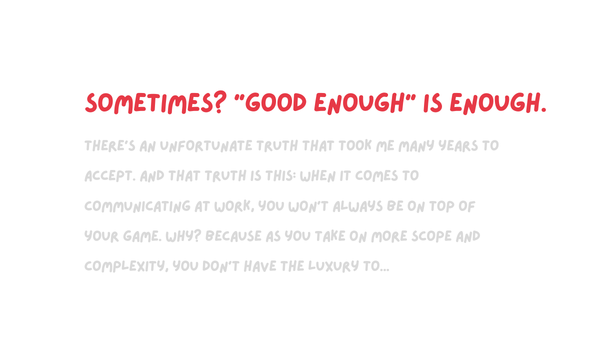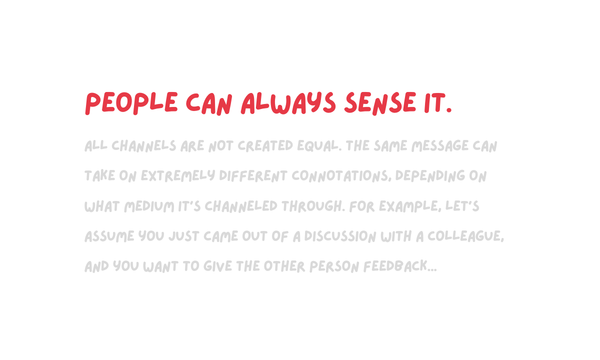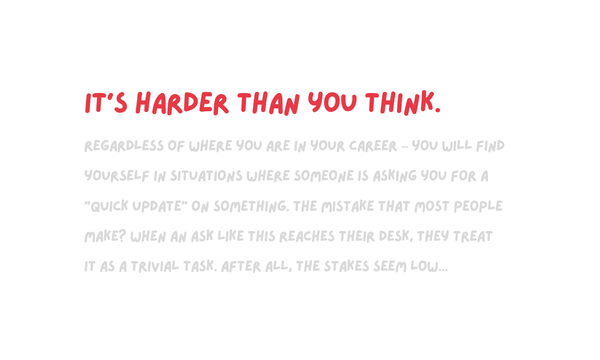I Am Not Qualified to Coach People. Here's How I Still Do it.

I'm not a career coach. I don't have decades of industry experience under my belt. I haven't had a particularly accelerated career path either.
But I still coach people. Here's how.
My guiding principle is simple: I cannot (and will not) tell people what to do. Even if I believe my advice to be sound, reasonable, and infallible. In fact, most of my coaching efforts actually go towards suppressing my own urge to give prescriptive advice.
What I try to do, instead, is help people think better. And I have found it useful to anchor on three simple things.
#1 I ask what we're solving for. Then I ask again.
This may sound trivial – hell, even condescending. But the truth is that most people (myself included sometimes) never push themselves to articulate this clearly.
For example: imagine someone comes to you and asks you whether they should take a new job offer.
Naturally, you would ask them what they're optimizing for. They'll usually have an answer. For instance, they might say they're trying to...
- ...achive better work-life balance
- ...pivot into a different domain area
- ...get a bigger title or job scope
But here's the trick. Ask them again, even if it sounds pedantic. This is where it really gets interesting.
For instance, when I had this conversation with a mentor, I told him about a future career move I was contemplating. I told him that I worried about being one-dimensional, and I wanted to acquire new skillsets and strengthen my profile.
He then simply asked: "Why do you want to strengthen your profile?"
I stuttered. It seemed like a no-brainer. But I never forced myself to articulate it.
So I scrambled for a response and said that I wanted to strengthen my profile to become more competitive for a certain job type. But as soon as I said it, I realized I still hadn't answered "why." Was it because that...
- ...I wanted to prove that I could take on new challenges and still thrive?
- ...I wanted more financial security in the future?
- ...I derive inherent pleasure from learning and mastering new things?
- ...or was it something else?
This was a teaching moment for me. And I started noticing it when the roles were reversed. I started noticing when people jump directly to weighing pros and cons before they've articulated their inherent motivation.
#2 I challenge assumptions.
A few years ago, I shared my career plans with a mentor of mine. I talked about roles I was looking at, and the qualifications that I met. I then waited for advice.
Instead of giving advice, she simply asked:
Why are you only looking at roles where you check most of the boxes?
Then it clicked for me. She didn't have to say anything else from that point on. I realized I had assumed that I should only look at roles that I was qualified (or even more than qualified) for. I had assumed that it was imprudent to try for roles that were stretchy for me.
But simply asking me to reconsider my assumptions made the world of difference for me. I dug deeper and realized my assumptions revealed my fear or rejection, among other reservations.
Here's another story. A colleague had come to me once to talk about career opportunities she was exploring. Within a few minutes, however, it was clear to me that she was only looking at roles within the company, and trying to work backwards to deduce what she could do.
Not what she wanted to do.
So I asked her to forget about the company and organization acronyms first. I wanted to hear about what she wanted to pursue if she could cast a much wider net. I challenged the assumption that her job search should start and end with internal role transfers.
Of course, she could very well end up still transferring internally. And it could very well be the right decision for her. But it will have been a much better decision (and process) if she challenged herself to start from a blank slate, rather than treating internal transfers as tablestakes.
She will have thought about what she's trading off if she leaves, and what she's gaining as a result.
She will also be forced to think about what she truly wants, rather than what the company can provide her.
Challenging assumptions is a small thing that can make a huge difference.
#3 I clarify decision frameworks and guiding principles.
Let me be clear: you can add value due to information asymmetry, i.e. when you somehow have more context and know more than the advice seeker. But that is also why it's called advising, rather than coaching.
After all, advice is specific to a certain person, time, and place (and even then it might not be the right advice). But better decision frameworks mean better decisions for the person both now and in the future.
Here's an example. I had a colleague come to me once and ask me whether he should consider a particular role. Naturally, I applied first principles and asked him what he wants to optimize for (and then I asked again).
As the conversation progressed, however, I realized he was potentially conflating peer pressure (i.e. his peers were being promoted faster) with what he was chasing.
So I threw hypothetical scenarios at him. I asked him how he would feel if he got the title but less pay. I asked him how he would feel if he got double the pay but a smaller scope. I asked him how he would feel if he did something he loved but had to sacrifice two other things.
And so on and so forth.
What happened was that he started realizing what he truly valued. And then he realized what he would prioritize if he was being honest with himself. And he started articulating the subconscious fears that were driving some of his decision principles.
By the end of the conversation, he knew where his heart was, and what his guiding principles were. Making the right decision was elementary by that point.
And throughout all of this, I did not have to give any prescriptive advice. I simply created scenarios, asked questions, and helped him polish his decision princIples.


